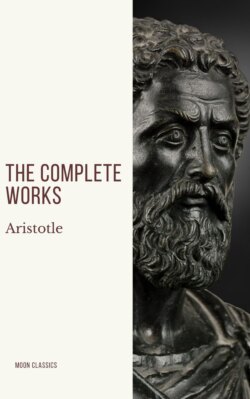Читать книгу Aristotle: The Complete Works - Aristotle - Страница 220
На сайте Литреса книга снята с продажи.
3
ОглавлениеThere are certain hypotheses upon which it is at once difficult to bring, and easy to stand up to, an argument. Such (e.g.) are those things which stand first and those which stand last in the order of nature. For the former require definition, while the latter have to be arrived at through many steps if one wishes to secure a continuous proof from first principles, or else all discussion about them wears the air of mere sophistry: for to prove anything is impossible unless one begins with the appropriate principles, and connects inference with inference till the last are reached. Now to define first principles is just what answerers do not care to do, nor do they pay any attention if the questioner makes a definition: and yet until it is clear what it is that is proposed, it is not easy to discuss it. This sort of thing happens particularly in the case of the first principles: for while the other propositions are shown through these, these cannot be shown through anything else: we are obliged to understand every item of that sort by a definition. The inferences, too, that lie too close to the first principle are hard to treat in argument: for it is not possible to bring many arguments in regard to them, because of the small number of those steps, between the conclusion and the principle, whereby the succeeding propositions have to be shown. The hardest, however, of all definitions to treat in argument are those that employ terms about which, in the first place, it is uncertain whether they are used in one sense or several, and, further, whether they are used literally or metaphorically by the definer. For because of their obscurity, it is impossible to argue upon such terms; and because of the impossibility of saying whether this obscurity is due to their being used metaphorically, it is impossible to refute them.
In general, it is safe to suppose that, whenever any problem proves intractable, it either needs definition or else bears either several senses, or a metaphorical sense, or it is not far removed from the first principles; or else the reason is that we have yet to discover in the first place just this-in which of the aforesaid directions the source of our difficulty lies: when we have made this clear, then obviously our business must be either to define or to distinguish, or to supply the intermediate premisses: for it is through these that the final conclusions are shown.
It often happens that a difficulty is found in discussing or arguing a given position because the definition has not been correctly rendered: e.g. ‘Has one thing one contrary or many?’: here when the term ‘contraries’ has been properly defined, it is easy to bring people to see whether it is possible for the same thing to have several contraries or not: in the same way also with other terms requiring definition. It appears also in mathematics that the difficulty in using a figure is sometimes due to a defect in definition; e.g. in proving that the line which cuts the plane parallel to one side divides similarly both the line which it cuts and the area; whereas if the definition be given, the fact asserted becomes immediately clear: for the areas have the same fraction subtracted from them as have the sides: and this is the definition of ‘the same ratio’. The most primary of the elementary principles are without exception very easy to show, if the definitions involved, e.g. the nature of a line or of a circle, be laid down; only the arguments that can be brought in regard to each of them are not many, because there are not many intermediate steps. If, on the other hand, the definition of the starting-points be not laid down, to show them is difficult and may even prove quite impossible. The case of the significance of verbal expressions is like that of these mathematical conceptions.
One may be sure then, whenever a position is hard to discuss, that one or other of the aforesaid things has happened to it. Whenever, on the other hand, it is a harder task to argue to the point claimed, i.e. the premiss, than to the resulting position, a doubt may arise whether such claims should be admitted or not: for if a man is going to refuse to admit it and claim that you shall argue to it as well, he will be giving the signal for a harder undertaking than was originally proposed: if, on the other hand, he grants it, he will be giving the original thesis credence on the strength of what is less credible than itself. If, then, it is essential not to enhance the difficulty of the problem, he had better grant it; if, on the other hand, it be essential to reason through premisses that are better assured, he had better refuse. In other words, in serious inquiry he ought not to grant it, unless he be more sure about it than about the conclusion; whereas in a dialectical exercise he may do so if he is merely satisfied of its truth. Clearly, then, the circumstances under which such admissions should be claimed are different for a mere questioner and for a serious teacher.
<
div id="section72" class="section" title="4">
